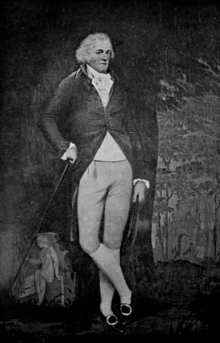Edward Austen Knight
Edward Austen Knight | |
|---|---|
 Austen around 1788 | |
| Born | (1768-10-07)7 October 1768 Deane, Hampshire |
| Died | 19 November 1852(1852-11-19) (aged 84) Godmersham, Kent |
| Occupation | High Sheriff of Kent |
| Spouse(s) | Elizabeth Bridges 1791–1808 |
| Parent(s) | George Austen and Cassandra Leigh |
| Relatives | Jane Austen, sister |
Edward Austen Knight (7 October 1768 – 19 November 1852), born Edward Austen, was the third eldest brother of Jane Austen, and provided her with the use of a cottage in Chawton where she lived for the last years of her life (now Jane Austen's House Museum). He was also High Sheriff of Kent in 1801.
Contents
1 Family
2 Knight inheritance
3 Estates
4 References
5 External links
Family
Edward was born in Deane, Hampshire, the third of eight children born to Rev. George Austen and Cassandra Leigh. He had five brothers: James (1765–1819), George (1766–1838), Henry Thomas (1771–1850), Francis William (Frank) (1774–1865), Charles John (1779–1852), and two sisters, Cassandra and Jane.
He married Elizabeth Bridges (1773–1808) on 27 December 1791, and together they had eleven children, Fanny Catherine (1793–1882) (one of Jane Austen's favourite nieces[1]), Edward (1794–1879), George Thomas (1795–1867), Henry (1796–1843), Reverend William (1798–1873), Elizabeth (1800–1884), Marianne (1801–1896), Charles (1803–1867), Louisa (1804–1889), Cassandra Jane (1806–1842) and Brook John (1808–1878).[2][3][4]
Knight inheritance

Presentation of Edward Austen to Thomas and Catherine Knight
When Edward was twelve years old he was presented to Thomas and Catherine Knight, who were relatives of his father and were wealthy.[5] Thomas had given George Austen the living at Steventon in 1761.[6] They were childless and took an interest in Edward, making him their legal heir in about 1783.[7][8][9]
The Knights paid for Edward to go on a Grand Tour when he was 18 years old, and he recorded many of his experiences in his Journals.[10] These have been edited by Jon Hunter Spence and published by the Jane Austen Society of Australia in 2004.[11]
When Thomas died in 1794 he left the Godmersham Park estate to his wife for her life, with the remainder going to Edward. She left Godmersham before her death to move to Canterbury, and gave up the estates to Edward.[12]
Edward inherited three estates from Thomas Knight, in Steventon, Chawton and Godmersham (which included a manor at Wittersham). The libraries from these estates were used extensively by Jane Austen.[13] When war broke out with France, Edward raised and was appointed Captain of the Godmersham and Molash Company of the East Kent Volunteers.[14]
In 1812 due to a stipulation in Catherine Knight's will, he changed his legal name to Knight.[5][7]
Estates
The rectory at Steventon, where the Austen family had spent their time growing up, and Jane is said to have written the first drafts of several of her books, was severely damaged by flooding and was knocked down by Edward in about 1823,[15]
and a new rectory was built by Edward for his son, William Knight, who had taken on the living.[16]
Edward made several improvements to Chawton House, including planting a walled garden, and forming new parkland to take advantage of the views from the house.
References
^ Republic of Pemberly
^ Genealogy Links
^ Chawton Manor and its owners: a family history p.172
^ Peerage.com
^ ab Jane Austen World
^ Victoria Country History
^ ab Stanford WH Auden Family Ghosts
^ "Famous Adoptions". Archived from the original on 11 September 2017. Retrieved 25 November 2012..mw-parser-output cite.citation{font-style:inherit}.mw-parser-output q{quotes:"""""""'""'"}.mw-parser-output code.cs1-code{color:inherit;background:inherit;border:inherit;padding:inherit}.mw-parser-output .cs1-lock-free a{background:url("//upload.wikimedia.org/wikipedia/commons/thumb/6/65/Lock-green.svg/9px-Lock-green.svg.png")no-repeat;background-position:right .1em center}.mw-parser-output .cs1-lock-limited a,.mw-parser-output .cs1-lock-registration a{background:url("//upload.wikimedia.org/wikipedia/commons/thumb/d/d6/Lock-gray-alt-2.svg/9px-Lock-gray-alt-2.svg.png")no-repeat;background-position:right .1em center}.mw-parser-output .cs1-lock-subscription a{background:url("//upload.wikimedia.org/wikipedia/commons/thumb/a/aa/Lock-red-alt-2.svg/9px-Lock-red-alt-2.svg.png")no-repeat;background-position:right .1em center}.mw-parser-output .cs1-subscription,.mw-parser-output .cs1-registration{color:#555}.mw-parser-output .cs1-subscription span,.mw-parser-output .cs1-registration span{border-bottom:1px dotted;cursor:help}.mw-parser-output .cs1-hidden-error{display:none;font-size:100%}.mw-parser-output .cs1-visible-error{font-size:100%}.mw-parser-output .cs1-subscription,.mw-parser-output .cs1-registration,.mw-parser-output .cs1-format{font-size:95%}.mw-parser-output .cs1-kern-left,.mw-parser-output .cs1-kern-wl-left{padding-left:0.2em}.mw-parser-output .cs1-kern-right,.mw-parser-output .cs1-kern-wl-right{padding-right:0.2em}
^ John Burke A genealogical and heraldic history of the commoners of Great Britain
^ Jane Austen Society of North America Archived 29 July 2012 at the Wayback Machine.
^ Google books
^ British History Online
^ The Free Library
^ Le Faye, Deirdre (1989), Jane Austen: A Family Record, Cambridge University Press,
ISBN 0-521-82691-8 p. 140
^ Austen Only
^ Jane Austen’s World
External links
Edward's silk coat:
- BBC History
Link to portrait:
- Art Finder